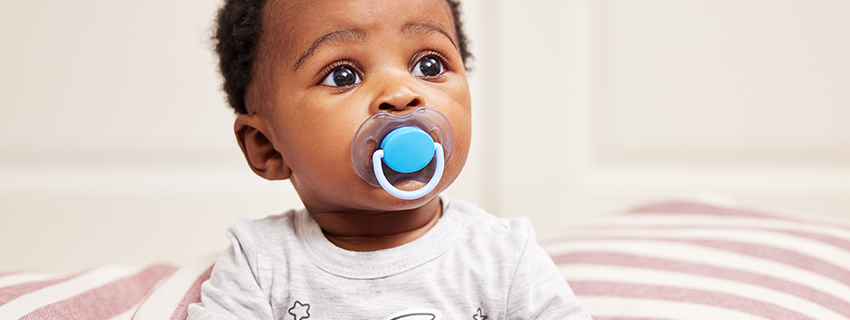
By Dr. Khadijah Al-Dahwah, General Academic Pediatrics
One of the decisions many new parents face is whether to give their infant a pacifier. Some mothers worry it can make it harder to breastfeed. Other parents wonder if prolonged use can damage a toddler’s growing teeth.
While both are legitimate concerns, there are also considerable benefits to giving your baby a pacifier. Most importantly, it’s a decision that parents can make after consulting with their pediatrician.
Perhaps the strongest reason to use a pacifier is that it may lower a baby’s risk for sudden infant death syndrome. Although it’s not clear how a pacifier helps, studies have found that pacifiers have a protective effect even when they fall out of an infant’s mouth. Pacifiers can also help soothe a fussy baby in addition to the comfort a parent can provide.
The American Academy of Pediatrics recommends that pacifiers should be used when an infant is going to sleep at bedtime or for a nap. If an infant doesn’t want to use a pacifier, it should not be forced. And if a pacifier falls out while a baby is sleeping, it does not need to be reinserted.
For mothers who are breastfeeding, the AAP recommends introducing a pacifier once nursing has been well established, which can take a few weeks and may vary with each child. (Breastfeeding is also associated with a reduced risk of SIDS.) Infants who are not breastfeeding can begin using a pacifier when the parent desires.
Pacifier safety tips:
- Never hang a pacifier around an infant’s neck. This can cause strangulation.
- Do not use a pacifier that attaches to infant clothing during sleep.
- Do not attach any items or stuffed toys to pacifiers because they can cause choking or suffocation.
- Always check your baby’s pacifier for cracks or tears. Damaged pacifiers should be thrown out.
- Replace your baby’s pacifier every two months to prevent damage.
- Do not dip a pacifier in honey or sugar, which can damage teeth.
Remember, although a pacifier can satisfy a baby’s need to suck, it should never be used to quiet a child who is hungry. Parents should try to stop using a pacifier when their baby turns 1.






